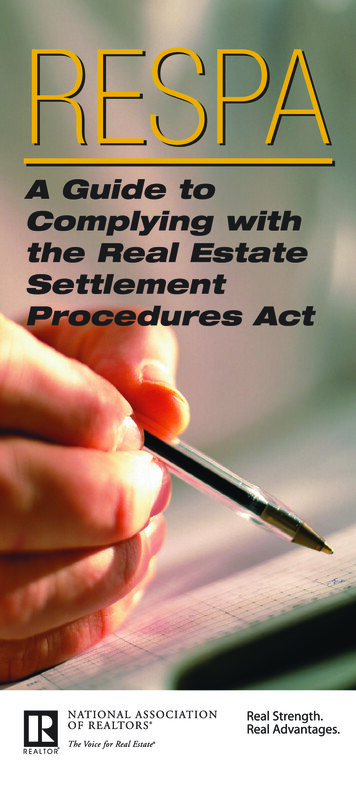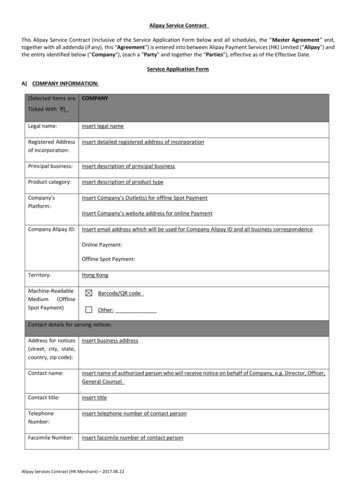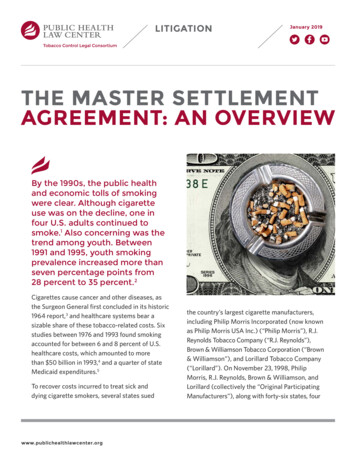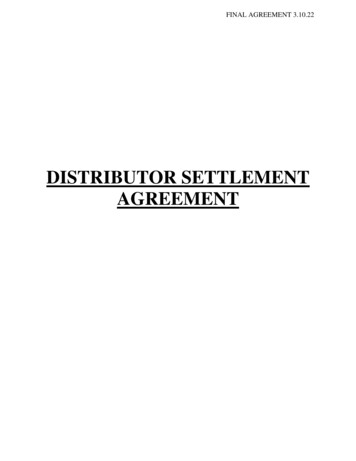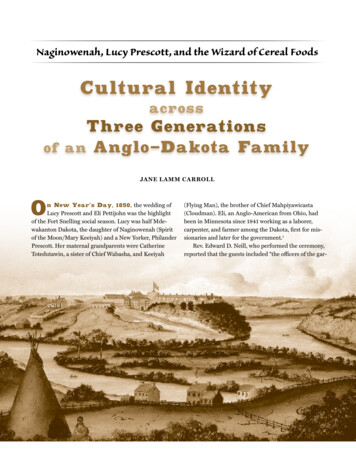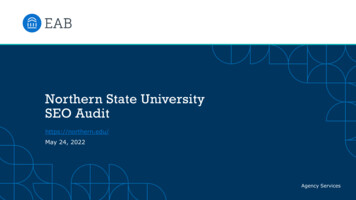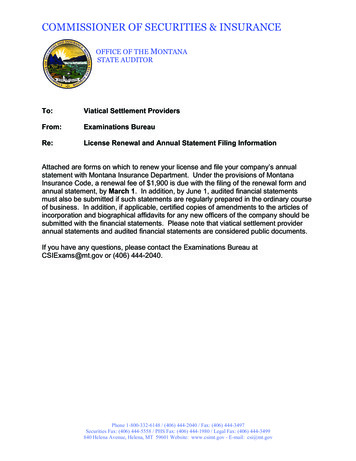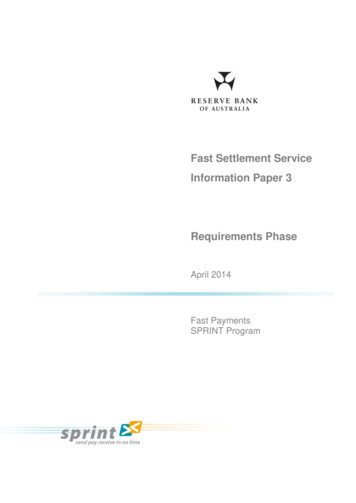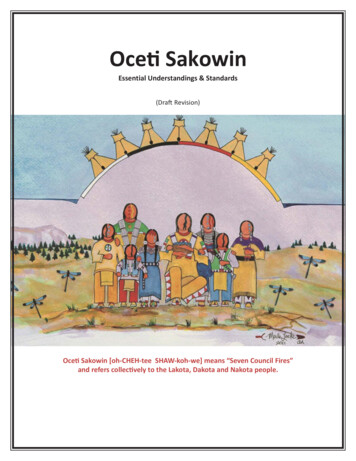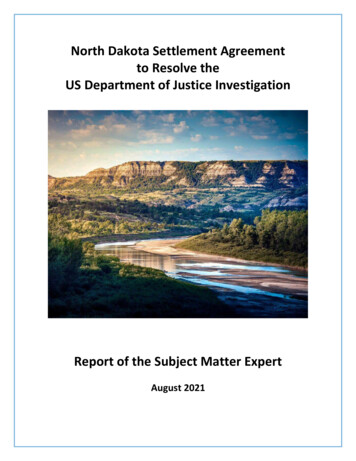
Transcription
North Dakota Settlement Agreementto Resolve theUS Department of Justice InvestigationReport of the Subject Matter ExpertAugust 2021
TABLE OF CONTENTSEXECUTIVE SUMMARYINTRODUCTION35The Settlement AgreementThe Subject Matter ExpertPurpose of this ReportNotable Progress by North DakotaRecommended Actions56778THE IMPLEMENTATION PLANAREAS OF PRIMARY FOCUS910Housing Availability and Home ModificationsIdentification of Target Population MembersCase Managers and Case ManagementPerson Centered Planning/Plans and Informed ChoiceNursing Facility Level of Care (NFLoC)Service Capacity to Address Target Population Member Needs in the CommunityQualified Service Provider EnrollmentCulturally Appropriate Services for Native AmericansAddressing the Needs of Target Population Members in Rural CommunitiesTrainingCapacity and Role Specialization of StaffData Information Technology (IT) System Conversion and ReportingRECOMMENDATONS22Conduct a Workflow/Business AnalysisConsider a Tiered Case Management SystemEnhance Alignment of Informed Choice Facilitation, Person Centered Planning,and Nursing Facility Level of Care (NFLoC) Assessment ProcessesProvide More Efficient Identification of At-Risk Target Population MembersReview Training Curricula and Consider RevisionsAssure Native American and Rural RepresentationComplete a QSP SurveyReview and Revise Case Management Documentation RequirementsReview and Revise the Enrollment Process for QSPsConsider Other Provider Models to Assist QSPsEstablish or Improve Tracking and Reporting 232424242525252526ND Settlement Agreement Report of the Subject Matter ExpertAugust 2021Page 2
EXECUTIVE SUMMARYIn December 2020 the State of North Dakota entered into a Settlement Agreement with theUnited States Department of Justice, resolving complaints alleging that the State fails toadminister long-term services and supports to adults with physical disabilities in the mostintegrated setting appropriate, as required by the Americans with Disabilities Act (ADA), 42U.S.C. §§ 12131-12134, and its implementing regulation, 28 C.F.R. §§ 35.101-35.190. As part ofthe Settlement Agreement, the State retained a Subject Matter Expert to provide technicalassistance, independent reviews of compliance with the provisions of the SettlementAgreement, and offer recommendations to the State to support compliance. This is the firstreport of the Subject Matter Expert (SME).The State is required by the Settlement Agreement to create and keep updated anImplementation Plan that outlines the strategies it will use to meet the requirements of theSettlement Agreement. As part of that Implementation Plan, the Subject Matter Expert createdfour plans to enhance those strategies in the areas of Capacity, Housing Access, Diversion, andSafety Assurance. Information included in the plans provide goals, strategies, and action stepsfor the State to consider to enable it to move efficiently and effectively in achieving compliancewith the Settlement Agreement.The areas outlined in the Settlement Agreement that require the focus of the State in order tomake the improvements necessary to achieve compliance include the following: case management, person centered planning, informed choice, access to information about home and community-based services, the diversion of Target Population Members (TPMs) from Skilled Nursing Facilities, transition services, housing services, building community provider capacity, and improving data collection and reporting.While early in the process of demonstrating and evaluating compliance to the SettlementAgreement, the State has begun making changes to address requirements. Some of the keyactions that have been undertaken by the State are included in the following table. This is not acomprehensive list of the actions that the State reports to have taken in support of its progressin meeting the requirements of the Settlement Agreement. Additional references are includedin the body of this report.ND Settlement Agreement Report of the Subject Matter ExpertAugust 2021Page 3
Initial Key Actions Undertaken By the StateThe movement of case managers from county employment to Stateemployment for improved consistency and oversight.Funding, hiring, and training of additional staff, including case managementpositions.The selection and initial implementation of a new case management system totrack and provide valid, reliable, and aggregate data.Training in and deployment of person centered planning.Increasing provider capacity and service array.Acquired Money Follows the Person Capacity Building Grant funds to supportadditional staff dedicated to informed choice and the development of aResource Center.Initiated stakeholder engagement.The SME has worked, and will continue to work, extensively with the State to provide technicalassistance to support the State’s efforts to achieve compliance with the requirements of theSettlement Agreement. The further development and implementation of key performancemeasures and compliance instruments will inform future reports, addressing strategies putforth by the State in the Implementation Plan. The Subject Matter Expert, in this report, hasprovided recommendations (beginning in detail on Page 22) that he suggests can contribute tothe State’s progress in meeting the requirements of the Settlement Agreement.The Subject Matter Expert recommends that the State focus on these recommendations duringthe next six (6) to 12 months. These recommended actions are detailed in this report. The Statereports implementation of some of these recommendations are underway. For others, theState has indicated it is developing strategies, as an aspect of its Implementation Plan, toinitiate recommended actions. Highlights of these recommendations include the following: Conducting a workflow/business analysis; Considering a tiered case management system; Enhancing alignment of informed choice facilitation, person-centered planning, andNursing Facility Level of Care (NFLoC) assessment processes; Providing for more efficient identification of at-risk Target Population Members; Reviewing training curricula and consider revisions; Assurance of Native American and rural population representation on all newworkgroups being convened as part of Implementation Plan strategies and that eachworkgroup has a clear, outcome-oriented charter; Completing a QSP survey to ascertain available services; Reviewing and revising case management documentation requirements to easeadministrative time and increase capacity for direct service provision; Reviewing and revising the enrollment process for Qualified Service Providers (QSPs)and agency providers; Considering other provider models to assist TPMs and QSPs; and Establishing or improving tracking and reporting mechanisms for data.ND Settlement Agreement Report of the Subject Matter ExpertAugust 2021Page 4
INTRODUCTIONThe Settlement AgreementIn December 2020 the State of North Dakota (ND) entered into a Settlement Agreement withthe United States Department of Justice (USDOJ), resolving complaints alleging that the Statefails to administer long-term services and supports to adults with physical disabilities in themost integrated setting appropriate, as required by Title II of the Americans with Disabilities Act(ADA), 42 U.S.C. §§ 12131-12134, and its implementing regulation, 28 C.F.R. §§ 35.101-35.190.The USDOJ notified North Dakota that it was opening an investigation in December 2015, afterthe USDOJ received complaints alleging that complainant adults with physical disabilities werecapable of, and did not oppose, living in integrated community settings with the types ofcommunity-based services that already exist in the State’s long-term care service system.Complainant adults further alleged that they and others like them could not access andmaintain necessary community-based services and were forced to enter, or were at serious riskof entering, nursing facilities to receive care.Both parties (USDOJ and the State of ND) recognize that providing adequate community-basedservices is the most effective way to enable individuals with disabilities to remain in or return tohome and community settings and are committed to full compliance with the ADA. To achievethe goal of long-term services being provided in the most integrated setting, the State hascommitted to developing and implementing effective measures to prevent unnecessaryadmissions to nursing facilities and to successfully transitioning nursing facility residents to thecommunity where appropriate and unopposed.For the purposes of the Settlement Agreement, a Target Population Member (TPM) is “anindividual with a Physical Disability over the age of 21 who is eligible or likely to become eligibleto receive Medicaid long term services and supports and is likely to require such services for atleast 90 days. The target population is comprised of:1. Individuals with physical disabilities who are at serious risk of entering nursing facilitiesto access Medicaid-funded long-term care composed of individuals with physicaldisabilities who (1) have been referred for a level of care determination screening toaccess nursing facility services and are likely to require long-term services and supports;or (2) need services to continue living in the community, have impairments that makethem likely to screen at a Nursing Facility Level of Care (NFLoC), and have beendetermined eligible for the Service Payments for the Elderly and Disabled (SPED)program with less than 25,000 in assets; or (3) need community-based services tocontinue living in the community and currently have a case management provider orhave contacted the State’s Aging and Disability Resource Link; and2. Individuals with physical disabilities who (1) are receiving Medicaid-funded nursingfacility services and are likely to require long-term services and supports; or (2) arereceiving nursing facility services, are likely to become eligible for Medicaid within 90days, have submitted a Medicaid application, and have approval for a long-term nursingfacility stay.”ND Settlement Agreement Report of the Subject Matter ExpertAugust 2021Page 5
The Subject Matter ExpertThe Settlement Agreement, in Section V, calls for a Subject Matter Expert (SME) to be retainedby the State to provide technical assistance, independent reviews of the work taking place,monitoring compliance with the Settlement Agreement, and making recommendations that theSME suggests will assist the State in meeting compliance requirements. The SME for thisagreement is Mr. Michael Spanier. Mr. Spanier has also engaged a team of individuals (the“SME Team”) to assist him in this work. The team members (Dr. Kris Ericson, Mr. Jim Jackson,Ms. Heidi Davis, and Ms. Patricia Barton) and Mr. Spanier delved into many important subjectareas key to compliance with the Settlement Agreement including: case management, person centered planning, informed choice, Nursing Facility Level of Care, diversion strategies, project management and workflow processes, safety assurance, provider capacity, training for case managers and providers, and information technology structures, processes, and reporting.Additionally, Mr. Spanier has engaged the Technical Assistance Collaborative (TAC) to providefurther expertise in the area of housing. In particular, TAC has provided assistance to the SME inmaking recommendations for addressing the gaps in housing and home modifications that areessential to the State being able to assure success in meeting the goals of the SettlementAgreement.The SME and SME Team drafted four plans that are incorporated into the State’sImplementation Plan in the areas of Housing Access, Capacity, Safety Assurance, and Diversion.These plans were crafted in such a way as to provide technical assistance to the State onresources, strategies, action steps, and performance and compliance measures to offer theState informed recommendations about how to effectively and efficiently reach the core goalsof the Settlement Agreement. The information contained in these plans is intended for use bythe State as it implements additional strategies throughout the eight (8) year term of theSettlement Agreement.Technical assistance, to be most constructive, requires a collaborative and problem solvingapproach between the SME and the State to be effective in addressing the needs and wishes ofTarget Population Members and, ultimately, achieving compliance with the SettlementAgreement. The US Department of Justice and the SME expect this technical assistance tocontinue throughout the length of the Settlement Agreement and be of a collegial andtransparent nature. In addition to the Agreement Coordinator, Ms. Nancy Nikolas-Maier, SMETeam members have met and will continue to work with other staff in the ND Department ofHuman Services as well as other entities to achieve the core goals of the SettlementND Settlement Agreement Report of the Subject Matter ExpertAugust 2021Page 6
Agreement. The SME Team extends our gratitude to the dedicated staff of the Aging ServicesDivision who responded to our inquiries and provided information on the nuances of the NorthDakota service delivery systems. The SME and his team will continue to work in partnershipwith the State to achieve success.Purpose of this ReportEvery six months, the SME will draft and submit to the parties a comprehensive and publicreport on the State’s progress with Implementation Plan strategies and performance measures,compliance with the Settlement Agreement, recommendations to reach compliance, andsuggestions for the focus of the next six (6) months. This is the Subject Matter Expert’s initialreport.During the next six (6) to 12 months, the Subject Matter Expert Team will transition further intoits role of monitoring and measuring compliance. Compliance instruments are being developedthat will provide the State with the opportunity to demonstrate compliance with the provisionsof the Settlement Agreement and the SME with the tools necessary to evaluate compliance.Future reports will focus on selected core compliance topics. Included in the State’sImplementation Plan are numerous performance measures that, when reported on, willprovide data to allow for further assessment of the State’s progress toward compliance.Specifically, the SME Team will focus on: Monitoring overall progress on the Implementation Plan; Analyzing and verifying data and compliance tasks to measure performance andprogress; Reviewing transition plans, especially for those discharged from Skilled Nursing Facilities(SNFs); Providing technical assistance in support of the State’s efforts; and Reviewing critical incidents, including those that lead to readmission to a SNF orhospital.Notable Progress by North DakotaThe State has made progress in several areas both prior to and subsequent to the execution ofthe Settlement Agreement. The SME acknowledges the significant work that the State hasundertaken and continues to take on in improving its service system and improving andenhancing the lives of TPMs. For example:1. Previously, case managers were in the direct employ of county social services agencies.On January 1, 2020, 64 case managers were moved to State employment. This changeprovided the ability for the State to better manage the work of those case managersassigned to address the needs of Target Population Members and better lends itself to aconsistent statewide approach to the provision of case management services.2. The State has begun training all case managers on the person centered planningprocess. The State has drafted a Home and Community-Based Services (HCBS)Companion Guide to the Charting the LifeCourse person centered planning tool to assistND Settlement Agreement Report of the Subject Matter ExpertAugust 2021Page 7
3.4.5.6.7.case managers in understanding the requirements of person centered planning anddevelopment of a person centered plan.The State has initiated implementation of a new information technology platform thatwill incorporate, over time, a complete person centered planning and informed choiceprocess and the ability to track such information in real time. In the course of this work,those TPMs who receive services through the Money Follows the Person (MFP) programwill also have transition plans built into the same comprehensive case managementrecord.The State has received a MFP Capacity Building Grant from the Centers for Medicareand Medicaid Services (CMS). The State will use this grant, in part, to build a robusttraining and resource center for Qualified Service Providers (QSPs) to improveenrollment processes, training, and ongoing support to assure that QSPs and TPMs canbe connected and receive services in an appropriate and timely fashion. QualifiedService Providers are those persons and agencies the State designates as authorized toprovide long-term services and supports. The State will also use funds from the MFPCapacity Building Grant to hire five (5) additional staff to assist with the facilitation ofinformed choice decision-making.From the date of the Settlement Agreement through June 14, 2021 the State reportsthat 29 TPMs residing in Skilled Nursing Facilities (SNFs) have successfully transitioned tothe most integrated setting and 117 TPMs have successfully been diverted fromplacement in a SNF and are receiving home and community-based services (HCBS).On January 1, 2021, the State added residential habilitation, community supportservices, and companionship services to its Centers for Medicare and Medicaid Services1915(c) waiver. These services will increase access to 24 hour supports for TPMs living inthe most integrated setting, medication administration, care coordination, andsupervision. As of this report, the State indicates it has enrolled 10 Qualified ServiceProvider agencies to provide residential habilitation and community support servicesand an additional two (2) are actively working toward qualification. Fifty-eight (58) QSPs(agencies and individuals) are enrolled to provide companionship services.The ND Department of Human Services, in conjunction with the needs of its AgingServices Division, received funding and position authorization from the 67th Assembly ofthe North Dakota Legislature, which meets biennially. The Legislature provided fundingfor a new position subordinate to the Settlement Agreement Coordinator to helpmanage the Settlement Agreement and its requirements, along with three (3) additionalfull-time equivalent (FTE) case manager positions to address the needs of TPMs.Recommended ActionsThe Subject Matter Expert suggests that the State focus on the recommendations noted inthe Executive Summary during the next six (6) to 12 months. The State reportsimplementation of a number of these actions are underway and the SME suggests thatfurther development is required. For others, the State has indicated it is developingstrategies, as an aspect of its Implementation Plan, to initiate recommended actions.Detailed information about these recommendations begins on Page 22.ND Settlement Agreement Report of the Subject Matter ExpertAugust 2021Page 8
THE IMPLEMENTATION PLANThe Settlement Agreement requires the State to develop and revise an Implementation Plan todemonstrate how it will ensure that all the requirements in the agreement are addressed andsuccessfully met over the term of the Settlement Agreement. Meeting the requirements as setforth will require enhancing systems and services for vulnerable populations such thatindividuals will always be able to choose where they want to live, despite any presentingdisability.As required in Section VI of the Settlement Agreement, the plan must:1. Identify benchmarks and timelines for meeting the Settlement Agreement’srequirements,2. Assign agency and division responsibility for achieving those benchmarks, and3. Establish a method to address challenges to implementation.Additionally, Section VI of the Settlement Agreement requires that the State engage withstakeholders early to identify concerns, goals, and recommendations regarding implementationof the Settlement Agreement. To that end, the State led six (6) initial listening sessions,concluding the last of these on March 31, 2021, and reported that more than 100 peopleattended. The State has reported that feedback from these listening sessions was used by theState as it drafted Implementation Plan strategies.On May 28, 2021, the State submitted its draft Implementation Plan to the Subject MatterExpert and the US Department of Justice (USDOJ). The State’s approach to its plan is inalignment with the requirements of the Settlement Agreement and included the developmentof strategies to achieve each requirement, noted challenges to individual strategies, andindicated plans for remediation. As requested by the State, the SME review of the draft planincluded a focus on recommendations for building a more fully functional service system thatcan be operationalized now and into the future.The four plans, drafted by the Subject Matter Expert, provide a breadth and depth ofinformation to the State to achieve the goals of the Settlement Agreement. These plans –Capacity, Housing Access, Diversion and Safety Assurance – include specific strategies andaction steps designed for incorporation into the current and future iterations of theImplementation Plan. The steps outlined in these plans can help the State operationalize theenvisioned system changes from today through the middle years of the Settlement Agreementtimeframe and on to the end, at which point the Settlement Agreement requires thatsignificant changes will have been made and codified to better serve the people of NorthDakota. Incorporation of additional action steps and strategies from these plans into the “body”of the Implementation Plan would further strengthen it. The SME looks forward to furtherdiscourse with the State on implementing additional strategies and taking necessary actionsteps to drive the necessary system and culture changes. Per Section VI of the SettlementND Settlement Agreement Report of the Subject Matter ExpertAugust 2021Page 9
Agreement, 18 months following the completion of the Implementation Plan and every yearthereafter the State – in consultation with USDOJ and the SME – will revise its ImplementationPlan.As of this writing the draft Implementation Plan has been reviewed and commented on byUSDOJ and the SME and returned to the State for their consideration. Included in this reviewwas a high level document provided by the Subject Matter Expert outlining 11 issues for theState’s attention. A revised plan is anticipated in August 2021. Reviewers will look for the Stateto incorporate some of the comments to the draft in the final plan.The final plan will provide a road map for the State through December 2022 to continue tobuild the necessary foundation and infrastructure to reach substantial compliance with theSettlement Agreement. The plan has dozens of specific tasks or activities that State staff willneed to complete within the next 18 months. In most instances, staff that are responsible forimplementation activities are also performing other activities that are not related to theSettlement Agreement. Therefore, it is essential that leadership pays particularly closeattention to staff bandwidth as critical milestones loom.In addition, stakeholder interest and participation will increase as changes are made. As keydeliverables are developed, the SME encourages the State to seek ongoing input from the SME,USDOJ, and stakeholders. This will allow the State to be transparent and improve the buy-inand quality of these deliverables. The State, following the requirements of Section VI of theSettlement Agreement, will review the Implementation Plan with future revisions to the planoccurring in conjunction with the review.AREAS OF PRIMARY FOCUSThere are several areas that require more immediate focus by the State for the next reportingperiod. These are areas that have demanded significant attention during this initial phase of theSettlement Agreement and the drafting of the Implementation Plan. Continued attention andrefinement in these areas is essential for the State to achieve success in meeting therequirements of the Settlement Agreement.Housing Availability and Home ModificationsAcross the country, the lack of affordable and accessible housing options is one factor leadingto institutionalization, homelessness, and housing instability. The challenge is exacerbated inrural areas where there is less housing inventory and, what housing inventory is available, maybe older (and therefore less likely to be accessible), of poor quality, and may not meet federal,state, and/or local housing standards.North Dakotans living with disabilities residing in Skilled Nursing Facilities (SNFs) who areconsidering transition to the community, come to this difficult housing landscape withadditional challenges, including discrimination in the rental market, incomes often below theND Settlement Agreement Report of the Subject Matter ExpertAugust 2021Page 10
Area Median Income, the need for home modifications to be able to return to the community,and difficulties navigating the housing search process while residing in an institutional setting.The State is aware of the amount of work that needs to be done to address housing options forTPMs. As outlined in the Implementation Plan, the State intends to convene a Joint HousingSupport Workgroup that will include individuals from the ND Department of Human Services(DHS) Aging Services Division, ND DHS Economic Assistance Division, and ND Housing FinanceAgency. Additionally, the State indicates that individuals from HCBS case management,transition coordination, rental assistance, and environmental modification will be representedin the workgroup to build stronger interconnectivity between disciplines. The State hasindicated that this workgroup will create recommendations and a plan to assist the State inaddressing housing requirements outlined in Section XII of the Settlement Agreement.The SME recommends that the State bring this workgroup together as soon as possible andestablish concrete outcomes and expectations for completing its work. According to theImplementation Plan, the State will rely on the workgroup to provide recommendations andstrategies that will allow the State to meet the requirements in Section XI of the SettlementAgreement. This includes transitioning at least 100 TPMs from Skilled Nursing Facilities to themost integrated setting by December 14, 2022 and being able to effectively manage housingneeds for Target Population Members in the future.A significant barrier that the workgroup and State will be challenged to address is the closing ofLutheran Social Services (LSS, which included LSS Housing, Inc.), a large provider of multipleservices in North Dakota. In January 2021, LSS announced that they were closing theorganization due to financial struggles. LSS Housing, Inc., launched in 2008, worked to addressthe need for affordable housing amid escalating rents and housing shortages across the State. Aproperty management arm of LSS Housing, Inc. also ensured that tenants and buildings weremaintained on a permanent basis. At the time of its closing, LSS Housing owned or managed 34properties in 22 towns across the State that provided housing to about 1,400 ta-files-bankruptcy-to-pay-off-creditors). Professionals in the State have noted thatit will take time for others to step in and manage those existing properties to retain a significantlevel of housing stock. This presents additional challenges for TPMs who need to maintain orsecure affordable and accessible housing to live in the community.In April 2021, funds from the Money Follows the Person (MFP) Grant were approved by CMSand received by the State. These funds will support the hiring of four (4) additional housingfacilitators and a housing initiatives coordinator, central actors in assisting Target PopulationMembers to return to community-based settings. The State reports that three (3) of thosepositions have been filled and it is actively recruiting to fill the final housing facilitator position.Increased capacity in staff is only part of the solution to improve the effectiveness of housingservices for TPMs. It is recommended that the State offer and implement clear guidance tocreate linkages, common goals and understanding between housing facilitators, transitionND Settlement Agreement Report of the Subject Matter ExpertAugust 2021Page 11
coordinators, and case managers. An effective data collection system, which is currently beingdeveloped and requires additional refinement, is essential to achieve this goal.Section XII.B of the Settlement Agreement requires providing Permanent Supported Housing(PSH) to 20 Target Population Members whose Person Centered Plan identifies that need withinone year of the effective date. In its first semi-annual report regarding requirements of theSettlement Agreement (dated June 14, 2021), the State reports that since December 14, 2020,29 Skilled Nursing Facility TPMs have successfully transitioned to the least restrictive setting.Seven (7) TPMs who indicated housing was a barrier for HCBS in their Person Centered Plan(PCP) were provided Permanent Supported Housing.A second area of immediate focus in the housing arena is the capacity of the State to assistTPMs with necessary home modifications to remain in or return to the community. In itscurrent §1915(c) Centers for Medicare and Medicaid Services Home and Community BasedWaiver, the State limits funding for disability related home modifications to “a recipient living intheir own home or the home of a family member.” The home must
ND Settlement Agreement Report of the Subject Matter Expert August 2021 Page 6 The Subject Matter Expert The Settlement Agreement, in Section V, calls for a Subject Matter Expert (SME) to be retained by the State to provide technical assistance, independent reviews of the work taking place,
